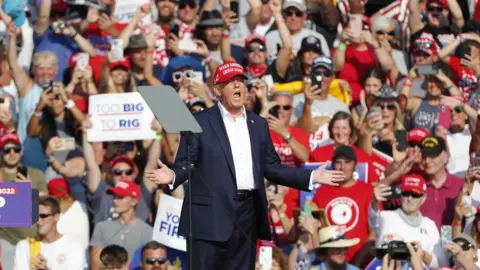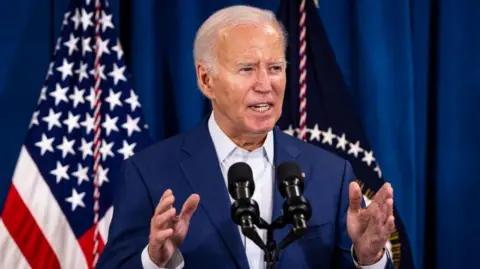 EPA
EPAA spray of bullets may have only grazed Donald Trump in Pennsylvania on Saturday night, but they killed one rally attendee and critically wounded two others.
They have also torn through the 2024 presidential campaign, damaging the social and cultural fabric of the nation. The illusion of security and safety in American politics – built over decades – has been dramatically shattered.
Trump received only minor injuries but it was close – a photograph by Doug Mills of the New York Times appears to show the streak of a bullet cutting through the air near the former president’s head.
Not since Ronald Reagan was shot by John Hinkley Jr in 1981 has there been such a dramatic act of violence directed against a president – or presidential candidate.
It harkens back to a darker time in US history, more than a half-century ago, when two Kennedy brothers – one a president and one a presidential candidate – were felled by assassin bullets. Civil rights leaders such as Medgar Evars, Martin Luther King Jr and Malcom X all also lost their lives in political violence.
Like today, the 1960s were marred by intense political polarisation and dysfunction, when a firearm and an individual willing to use it could change the course of history.
It is difficult to predict the impact Saturday’s events will have on America – and its political discourse. Already, there have been some bipartisan calls for a cooling of rhetoric and national unity.
Within hours of the incident, President Joe Biden – Trump’s likely opponent in November – appeared before cameras in Delaware to make a statement to the press.
“There is no place in America for this kind of violence. It’s sick,” he said. “We cannot be like this. We cannot condone this.”
The president later spoke by phone with the former president. He cut short his weekend at the beach and is returning to the White House late Saturday evening.
But the violence has also quickly filtered into the bare-knuckle partisan trench-warfare that has characterised American politics in recent decades. Some Republican politicians have laid the blame for the attack on Democrats who have employed dire rhetoric about the threat they say the former president poses to American democracy.
“The central premise of the Biden campaign is that President Donald Trump is an authoritarian fascist who must be stopped at all costs,” Ohio Senator JD Vance, who is reportedly on the shortlist to be Trump’s vice-presidential pick, posted on social media. “That rhetoric led directly to President Trump’s assassination attempt.”
Chris LaCivita, the Trump campaign manager, said that “leftist activists, Democratic donors and even Joe Biden” need to be held accountable at the ballot box in November for “disgusting remarks” that in his view led to Saturday’s attack.
Democrats may object, but many on the left used similar language to describe the culpability of right-wing rhetoric in the months before the 2011 near-fatal shooting of Congresswoman Gabby Giffords in Arizona.
 Getty Images
Getty ImagesThe Pennsylvania violence will undoubtedly cast a long shadow over the Republican convention, which begins on Monday. Security protocols will be tightened, and the protests – and counter-protests – near the site could be accompanied by a new sense of foreboding.
Meanwhile, an even brighter national spotlight will shine on the party’s nominee when he takes the stage on Thursday night.
Images of the former president, bloodied, with an upraised fist are sure to become a rallying point in Milwaukee. The Republican Party was already planning to make strength and rugged masculinity a central theme, and Saturday’s incident will give that a jolt of new energy.
“This is the fighter American needs!” Eric Trump wrote on social media, accompanied by a photograph of his father after the shooting.
The US Secret Service will also face intense scrutiny for its handling of security at the Trump rally. An individual with a high-powered rifle was able to come within firing distance of a major presidential candidate.
Speaker of the House Mike Johnson is promising that his chamber will conduct a full inquiry. Those investigations will take time.
But for now, one thing is clear: in a year of uncharted electoral waters, America’s politics have taken a new, deadly turn.



































